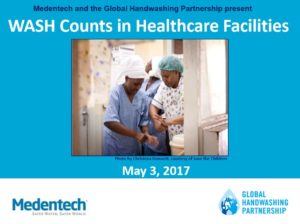WASH Counts in Healthcare Facilities: From awareness to action
Published: May 5, 2017 / Published by Global Handwashing Partnership, Medentech, WHO, USAID Maternal and Child Survival Program & Beninese Association for Social Marketing

This webinar summary provides context on the status of WASH in healthcare facilities, as well as insights into assessments, programs and action plans to reduce healthcare-associated infections linked to inadequate hand hygiene.
The lack of access to an improved water source and availability of soap at many healthcare facilities (HCF) in resource-limited settings is a real problem. This along with the gaps in the awareness of the importance of enhanced hygiene and infection prevention undercut the ability for healthcare providers and staff to offer safe services. This also means that visitors can struggle to protect themselves from spreading and acquiring infections. In order to practice good hygiene in health settings, water and soap must be accessible. However, a recent UNICEF/WHO report on the availability of water, sanitation, and hygiene (WASH) in 66,000 health facilities in 54 countries stated that 38% did not have an improved water source, 19% did not have improved sanitation facilities, and 35% did not have soap and water for handwashing. However, implementing improved WASH services and programming with existing prevention practices in HCFs can help reduce certain healthcare-associated infections (HCAI) by 70%.
Hand Hygiene Day takes places annually on May 5th. To help celebrate, the Global Handwashing Partnership, Medentech, World Health Organization (WHO), USAID’s Maternal & Child Survival Program (MCSP), and the Beninese Association for Social Marketing (ABMS) held a webinar on May 3 to highlight the importance of WASH in HCFs to prevent the spread of HCAIs. The conversations explored catalyzing behavior change around proper hygiene compliance, highlighted existing recommendations intended to improve WASH conditions, and shined a spotlight on how their organizations are innovating to improve safer conditions, services, and quality of care in health settings.
The first presenter, Arabella Hayter of the World Health Organization, provided an update on the WHO/UNICEF Global Action Plan on WASH in HCFs. Ms. Hayter shared recent evidence and data from the2015 WHO/UNICEF Global Assessment of WASH in HCF on access in healthcare facilities. She addressed prioritizing WASH in HCF as a necessary input to achieving all global and national health goals, especially those linked to universal health coverage, maternal & child health, and antimicrobial resistance. She also explored the key change objectives and targets for the Global Action Plan and discussed how implementing WASH access in HCFs on behalf of SDG 6 can catalyze action for other Goals, including good health (SDG 3), renewable energy (SDG 7), climate action (SDG 13), and creating partnerships (SDG 17).
Visit the WASH in HCF knowledge portal to learn more about WASH, infection prevention and control, and antimicrobial resistance in health settings here, and view the Water & Sanitation for Health Facility Improvement Tool (WASHFIT) here.
Ian Moise, WASH Advisor for USAID’s Maternal & Child Survival Program explored how WASH underpins quality of care and contributes to health systems strengthening. Mr. Moise addressed how MCSP works to reduce barriers, including gaps in accountability, poor infrastructure, and disempowerment of workers, among others. He highlighted successes and lessons learned from the Clean Clinic Approach—based on MCSP’s experiences implementing the program in Haiti—which aims to empowers HCFs to become clean, safe, and desirable. He also explored how government ownership of WASH implementation in HCFs can result in stronger resource allocation, increase access to improved water and hygiene services, improve maintenance of sanitation facilities. Maintaining quality ensure requires consistent supervision with a focus on the clinics with the highest needs.
Visit the MCSP website here and learn more about the Clean Clinic Approach here.
Dr. Mbola Razafimahefa, Deputy Director of ABMS—PSI’s network member in Benin—shared an overview of how her social marketing non-profit supports HCFs in Benin to improve hygiene and make services safer for patients. In addition, Dr. Mbola explained how ABMS supports the government and private sector throughout the country to improve the lives of families by making quality health products and health services available at an affordable cost. She discussed the importance of quality assurance and improvement standards and systems in HCF, the significance of data-informed decision-making, and needs of health clinics in the country’s limited-resources settings. She also noted the importance of motivating and empowering providers while ensuring that they have the tools and supplies to do their work. Social recognition through peer supervision is one such example of how this can be achieved.
Learn more about ABMS on the PSI Impact site here and about its work with the PROFAM social franchise network here (in French).
In the last presentation, Michael Gately, Medentech’s Managing Director, highlighted his organization’s work on infection prevention around the world and highlighted the contribution its disinfectant products offer for continued hygiene improvement in healthcare clinics. Mr. Gately explained that not only does WASH improve the quality of care in HCF and save people’s lives, but reduces costs, overcrowding, and productivity loss. He also explained the importance of behavior change and provided insight on tools used to assist in sustaining behavior change, as well as the benefits of eliminating harmful germs and microorganism that transmit infections.
Learn more about Medentech’s work and its products here.
You can learn more about the key takeaways from these presenters and their organizations’ interventions by watching a recording of the webinar here.
- Resource Attachments:
- https://globalhandwashing.org/wp-content/uploads/2017/12/WASH-Counts-in-HCFs-webinar-slide-FINAL.pdf (pdf)
TAGS: Event Recording IntegrationHandwashing PromotionAdvocacy & PolicyMonitoring & EvaluationHygiene in Health FacilitiesMaternal Newborn & Child HealthHandwashing Technologies ImplementersPolicy Makers English 2017